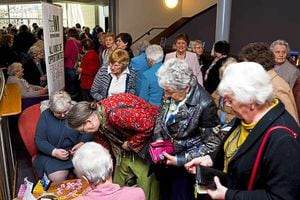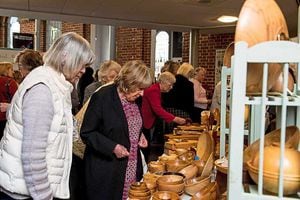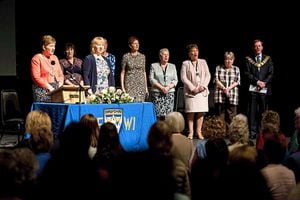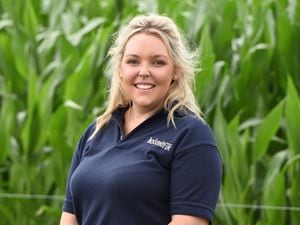WI speakers get the balance just right at Shrewsbury's Theatre Severn
In typical Women's Institute style, they got the balance just right. The morning speaker at the Shropshire federation's annual gathering at Shrewsbury's Theatre Severn was the principal of a county school which currently takes students from 44 countries.

While the afternoon session began with a thoroughly engaging and entertaining talk from a leading TV gardener and author.
And hundreds of WI members and their guests just loved the mix.
Neil Hawkins, from Concorde College at Acton Burnell, painted a vivid picture of college life but also expanded the theme to take in wider education.
While Pippa Greenwood, a regular favourite on both Radio 4s Gardeners' Question Time and BBC2's Gardeners World, won hearts as she described her early interest in gardening, growing and fascination with bugs.

Pippa is a British plant pathologist. She appears frequently on the BBC's long running Gardeners' World TV programme and has been a regular panelist on Gardeners' Question Time on BBC Radio 4 since 1994.
She was also the gardening consultant on the popular ITV series Rosemary and Thyme starring Felicity Kendal and Pam Ferris.
Her mother was first to nurture a knowledge of gardening – punctuated, she recalls, by a thermos of cocoa.
Eventually, Pippa's formal further education was at Durham University where she trained as a botanist. She subsequently got an MSc in crop protection at Reading University and then for 11 years, ran the Royal Horticultural Society's Plant Pathology Department at Wisley. As a by the way, pests and bugs seem to have been a lifelong passion for her
Neil Hawkins immediately nailed his colours to the mast by saying: "Education is a wonderful, wonderful profession. I am so delighted to be part of it."
Indeed as principal Neil believes there is nothing more fulfilling than being able to help make a difference to the lives of young people.
"The future belongs to the young and we shouldn't forget that," he says. With a twinkle in his eye, Neil then addressed the matter of how smiling is, on the whole, better for our health than frowning.

Now you would think that was self-evident. But it seems that surveys and scientific examinations have been undertaken to find proof positive of it.
And if anyone thinks that doesn't have an awful lot to do with education, Mr Hawkins begs to differ.
He says: "We do try to encourage young people to enjoy their education and find happiness in it. Concord is a happy, friendly school and I believe we mustn't label young people, they are growing and changing all the time. Education needs to prepare them to be what they want to be."
And wherever possible, with a smile of course! One of those fortunate students is Concorde College day girl Lottie Cansdale who amazed her WI audience with her prize-winning talk on The Girl Effect.
Lottie lives in Shrewsbury and is hoping to become a doctor – but right now she is passionate about challenging the stereotypes she still believes exist.
No wonder the sixth former was voted best speaker at the national final of a top public speaking competition last month.
She believes that: "History really is His Story. Education and emancipation for women in the Third World will become the solution. Women are not the problem, they are the solution." And she sat down to rapturous applause. With a smile.
Back on home grown, the 123 Women's Institutes in Shropshire with more than 3,300 members between them are delighted that at the national gathering in June, this year at Brighton, Shropshire has won a coveted place with their submitted resolution on avoiding food waste and addressing food poverty.
And Anne Yeeles of Snailbeach WI will be proposing it. She says: "I grew increasingly concerned seeing food fit to be sold the day before, suddenly being labelled not fit to eat. I did some investigation and realised the epic size of the waste problem."
Everyone wishes Anne well on that one as they all agreed we need educating a bit more.
Humble origins from across the Atlantic

It was pioneering, spirit-lifting and a jolly good day was enjoyed by all. But who is surprised?
This after all, was the WI in action. And despite the idea some people have, Women's Institute members are not merely about tea parties and jam making – in truth, they never have been.
Of course they do all that alongside everything else but their net has always stretched much wider ever since the birth of just one small group in Stoney Creek, Canada.
And the reason this particular gathering ever got together? Because a baby had died unnecessarily, simply due to lack of knowledge.
The first Women's Institute was formed in Stoney Creek, Ontario, Canada as a branch of the Farmer's Institute. Inspired by a talk given by Adelaide Hoodless at a meeting of the Farmer's Institute and local farmers were instrumental in setting up the new organisation. They were supported by Ontario government who and the first organiser was appointed in 1899.
The movement brought women from isolated communities together and offered training in home economics, child care and those aspects of farming that were traditionally done by women, like poultry keeping and small farm animal husbandry.
As a direct consequence, the WI movement in Britain began in 1915 and its centenary was celebrated last year in great style – including the big birthday cake being cut by the Queen.
However, during the First World War its initial aim was to encourage countrywomen to get involved in growing and preserving food to help to increase supplies to our war-torn nation.
And so the first WI in Britain was formed under the Agricultural Organisation Society umbrella and Canadian Madge Watt was given the task of starting the ball rolling for institutes across the UK. The first one was not a million miles from us, at Llanfair PG, on the island of Anglesey and the first WI in England was founded in Sussex while the movement which had found such eager legs was soon to spread across the globe.
So you could say that those first seeds which were sown in the back of beyond and have helped transform lives across the world, began its own life round just one word: education.





